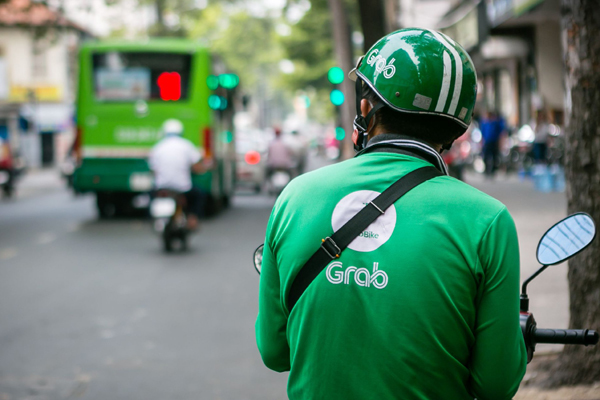Top Vietnamese phrases for taking a Grab / Be / Taxi

Have you ever felt a little bit tense when the Grab driver called you? Maybe you're afraid that you won't be able to understand a thing that the driver says.
But imagine,
Wouldn't it be nice if you can understand what they might ask and be able to tell them what you want?
Don't worry, I got you!
I'll teach you the most common and useful Vietnamese phrases that I myself, as a local, would use when taking a taxi or a Grab/Be/GoViet.
These phrases would definitely make the ride smoother for you and even for your friends, so be sure to share this post with them!
In this post, you'll learn:

How to address your driver
I've seen many expats using the word em to address every one they see.
However, that's not the case!
You should address a Vietnamese person based on their age, gender and profession.
To make things simple, below is a summary of how to address your driver and yourself.
| If your driver looks .. | Address him/her as .. | Address yourself as .. |
| --- | --- | --- |
| old enough to be your older brother | anh | em |
| old enough to be your older sister | chị | em |
| young enough to be younger sibling | em | anh (male)
chị (female) |
| old enough to be your uncle | chú | con |
The driver would usually address you ass anh if you're a man, and chị if you're a woman.
All the sentences in this post assume the driver is a male who looks to be around your age or older anh.
If you want to learn more about how to address Vietnamese people appropriately (which is very important to show respect), check out my mini-course Introduction to Vietnamese grammar.
Common questions asked by the driver
Let's start with some common questions that the driver might ask you and how you can answer them.
1. Anh/chị đi [address] phải không?
Literally: "You go to [address] right?"
Examples:
- Anh đi Thảo Điền phải không? - You go to Thảo Điền right?
- Chị đi Sài Gòn Center phải không? - You go to Sài Gòn Center right?
To answer this question, you can say:
- Đúng rồi - That's right
- Không phải - That's not right
2. Anh/chị tên là [name] phải không?
Literally: "Your name is [name] right?"
Examples:
- Anh tên là John phải không? - You're John right?
- Chị tên là Jane phải không? - You're Jane right?
Since this question asks for info confirmation phải không, just like the previous phrase, you can say:
- Đúng rồi - That's right
- Không phải - That's not right
3. Anh/chị tới chưa?
Literally: "You arrive yet?"
which means, "Have you arrived yet?"
You can use this question to ask whether the driver is there to pick you up.
To answer this question, you can say:
- Sắp tới rồi - Coming! (=Soon arriving)
- Tới rồi - Arrived already!

4. Anh/chị đang đứng ở đâu?
Literally: "You're standing at where?"
which means, "Where are you standing?"
To describe your current location, you can say:
Em đang đứng ở ... = I'm standing in/at ...
- địa chỉ [ABC] = [ABC] address
- **trước cửa [ABC] ** = the front gate [ABC]
- góc đường [A] và [B] = the corner streets [A] and [B]
- đầu hẻm [ABC] = the front alley [ABC]
5. Anh/chị đi đâu?
Literally: "You go where?"
which means, "Where are you going?"
This phrase can be asked by the cab driver or Grab driver to confirm your destination. You can reply with:
- Cho tới [address] = Take me to [address]
6. Anh/chị biết đường không?
Literally: "You know the way?"
which means, "Do you know the way?"
Since it's a simple yes-no question ending with không, you can say:
- Có - Yes
- Không - No
- Em biết - I know
- Em không biết - I don't know
Telling the driver to wait
To tell the driver to give you a few minutes to come, you can say:
7. Anh chờ [number] phút
Literally: "You wait [number] minutes"
Examples:
- Anh chờ hai phút - You wait 2 minutes
- Anh chờ năm phút - You wait 5 minutes
You can also tell the driver that you're coming by saying:
- Em đang tới - I'm coming
- Em đang đi xuống - I'm going down (taking the lift)

Giving Directions
Whenever you want to get your driver attention, you can say:
- Anh ơi - *Hey (older) bro *
- Chị ơi - Hey (older) sis
- Em ơi - Hey (younger) bro / Hey (younger) sis
- Chú ơi - Hey uncle
8. Anh ơi, [direction command]
While being on the road, if you see the driver is unsure about the directions, help him out with these basic phrases:
Anh ơi, ...
- quẹo trái - turn left
- quẹo phải - turn right
- đi thẳng - go straight
- lùi lại - move back
- dừng ở đây - stop here
- dừng ở kia - stop there
- vòng lại - turn around
- sai đường rồi! - wrong way!
Making Requests
Here are some easy phrases that you can use if you have any requests for the driver while on the trip.
9. Anh ơi, làm ơn [your request]
Literally: "Hey, please ... "
Anh ơi, làm ơn ...
- đi chậm lại - go slower
- đi nhanh một chút - go a little faster
- bật máy lạnh - turn on the air-con (in the car)
- tắt máy lạnh - turn off the air-con (in the car)
- mở cửa sổ - open the window (in the car)
Paying the fare
After arriving at your place safely, you can use the phrase below to ask for the ride fare.
10. Bao nhiêu tiền?
Literally: "How much money?"
The driver would probably show you the amount on his meters or on the phone app. But if you want to learn how to understand Vietnamese money, prices and how to bargain, here is a useful mini-course of Vietnamese numbers, money and bargaining
If the driver forgets to give you back the change or you want to give him the change, you can tell him nicely with the following phrases.
- Anh làm ơn thối tiền - Please give the change
- Khỏi thối - Don't need to give back the change
Don't forget to say cảm ơn - thank you before leaving.

Useful phrases for COVID-19
My Italian mate recently asked me to teach him a few useful phrases for Grab, after hearing that a driver asked the nationality of an expat before picking him or her up. So I thought I would include these phrases here too.
Please stay safe, wear a mask, else your driver may feel uncomfortable and refuse to drive you. They simply don't want to unknowingly get affected, and then spread it to their loved ones. I know you would do the same if you were them.
- Em là người [country name] - I am [ ]
- Em ở Việt Nam [duration] rồi - I've stayed in Vietnam for [duration] already
- Em chưa ra khỏi Việt Nam - I've not gone out of Vietnam
You can substitute [duration] with a number + days/months/years
- ngày - day / days
- tuần - week / weeks
- tháng - month / months
- năm - year / years
NOTES:
If you don’t know how your country/nationality is called in Vietnamese, you can refer to my list of 50 countries & nationalities in Vietnamese.
Be the first to know
Join our Newsletter to receive monthly learning tips and updates!
